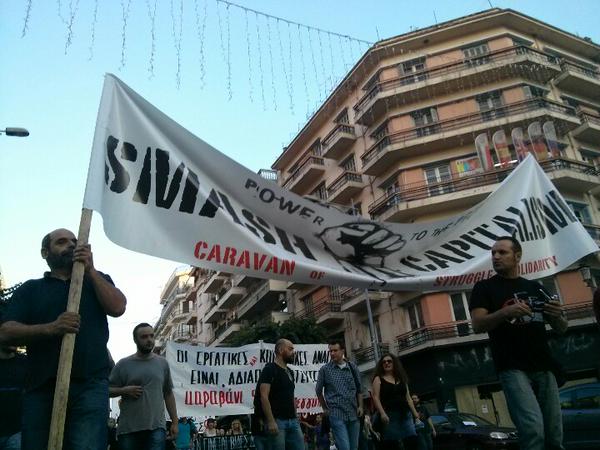 [1]
[1]Anarchist/anti-capitalist protest in downtown Thessaloniki criticizing “Syriza's light austerity.” Photo by Asteris Masouras. Used with permission.
His brief biography on Twitter [2] reads: “social justice/stay human.” And Asteris Masouras [3] is a true humanist. For this reason, he hopes that the socioeconomic crisis [4] plaguing his home country of Greece—and which also threatens to spread throughout Europe—can eventually be solved through solidarity and a compromise with justice.
Asteris is an engineer and photojournalist. As editor of Global Voices in Greek [5], he has covered popular uprisings in Tunisia, Egypt, Syria, and the rest of the Middle East and North Africa. Over the past few months in Thessaloniki (Greece's second largest city), he has devoted himself to following the debt crisis, the impact of austerity measures, and the reactions in the streets. In an interview with Global Voices, Asteris analyzes the Greek crisis, its roots, and its possible ramifications.

Asteris Masouras. Photo courtesy Asteris Masouras.
Global Voices (GV): How has Thessaloniki responded since the referendum?
Asteris Masouras (AM): El centro de la ciudad estuvo prácticamente vacío durante todo el domingo, mientras se celebraba el referéndum. La mayoría de la gente se concentraba junto a la playa, disfrutando de la brisa de estos días, como si tratasen de saborear unos momentos de paz antes de la noticia. La celebración del ‘no’ estalló horas después, junto a esa misma playa.
AM: The city's downtown was practically empty all day Sunday while the referendum was taking place. The majority of people got together next to the beach, enjoying the days’ sea breeze, almost as if trying to savor a few moments of peace before hearing the news. The celebration of the “no” vote exploded hours later, right next to that same beach.
GV: What are your thoughts on the results?
AM: La evolución de los últimos días, y estos resultados, nos dan esperanza para enfrentar unas negociaciones hostiles y buscar un acuerdo más justo. El ‘no’ dominó en todo el país, pero lo hizo de forma abrumadora en los barrios más pobres, los más castigados por las medidas de austeridad, mientras que los barrios ricos hubo mayoría del ‘sí’. El 61 por ciento de los griegos dijo ‘no’ a un ultimátum de austeridad destructivo, en un contexto de control de capitales y de un acoso institucional y mediático brutal.
AM: Developments over the last few days, and their results, give us hope to be able to come face-to-face with hostile negotiations, and seek out a fairer deal. The “no” vote held strong throughout the entire country; however, this was seen overwhelmingly in the poorest neighborhoods; the ones who most suffered from the austerity measures. Meanwhile, the majority who voted “yes” came from the rich neighborhoods. 61 percent of Greeks said “no” to the destructive austerity ultimatum amidst an environment of capital control and brutal harassment brought upon by the media and institutions.
GV: Tell us more about the media's role, especially regarding the last few months.
AM: Los medios de comunicación de masas griegos se han superado a sí mismos en su propaganda y en la forma de sembrar el miedo para intentar que la gente no pueda pensar con claridad en el momento más crítico en la historia reciente de la democracia griega (y quizás también de la europea). En vez de informar racionalmente sobre los problemas que afectan a los griegos, y las decisiones que estos toman desde su libre voluntad, se ha negado a la gente cualquier tipo de agencia, imponiendo una agenda clara basada en intereses comerciales. La corrupción en Grecia es endémica y tiene sus raíces en los intereses de los dueños de los medios y las élites políticas. Pero el referéndum ha demostrado que los griegos están dispuestos a plantarles cara y no se van a acobardar fácilmente.
AM: The Greek mass media has outdone itself in terms of propaganda, and in the way it spreads fear so that people are unable to think clearly during the most critical moment in the recent history of Greek democracy (and perhaps Europe's as well). Instead of sensibly reporting on the problems that are affecting Greeks, and the decisions that they make of their own free will, it has denied the people any form of agency, imposing upon them an agenda that is clearly rooted in commercial interests. Corruption in Greece is endemic, planting its roots in the interests of media owners and elite politicians. But the referendum has shown that the Greeks are ready to face them and will not be so easily intimidated.
GV: In Spain, there has been a lot of focus on the relationship between Greek political party Syriza and Spanish political party Podemos (“We Can”) and the way in which the success of one determines that of the other. What do you think these results mean for Spain?
AM: Es obvio que el estilo duro de negociación que emplean las instituciones contra Grecia tiene mucho que ver con el deseo de evitar el “efecto contagio”. Se castiga a Grecia por votar a Syriza y desafiar el discurso dominante. Los ataques de Rajoy contra Grecia y el gobierno de coalición que han hecho daño tanto a Grecia como a la UE [Uniión Europea] tienen mucho que ver con el miedo a Podemos, pero creo que al Gobierno español esto se le puede volver en contra si el referéndum griego termina beneficiando a Podemos.
AM: It's obvious that the institutional tough negotiation measures against Greece have a lot to do with wanting to avoid the “contagion effect.” Greece is being punished for having voted for Syriza and defying the dominant discourse. [Prime Minister of Spain] Mariano Rajoy's attacks against Greece and the coalition government that have done so much damage to Greece, as well as to the European Union, has a lot to do with fear of Podemos; but I think there might be backlash against the Spanish government if the Greek referendum ends up benefiting Podemos.
GV: We met right before the 2011 protests in the Middle East, Spain, and other countries. Many things have changed since then. Is Greece the latest episode of public discontent?
(AM): De algún modo sí, aunque el descontento griego con la corrupción y las políticas neoliberales es anterior a la Primavera Árabe y los movimientos “indignados”. El movimiento obrero y de protesta griego lleva años aumentando, en contra de las políticas bipartidistas clientelares. Con la crisis y las medidas de austeridad, se ha ido rompiendo el bipartidismo de Nueva Democracia y PASOK (los dos principales partidos históricos griegos) y la gente se ha unido en torno a ese movimiento indignado en el que desde luego han influido las protestas del resto de la región.
AM: In a way, yes, although the Greeks’ anger over corruption and neo-liberal politics comes before the Arab Spring and the “indignant” movements. The workers’ movement and protests in Greece have been growing over the years against patronage and bipartisan politics. With the crisis and austerity measures, the two-party system including New Democracy and PASOK (the top two historical parties in Greece) has been dissolving; and the people have come together with the indignation movement, which has since then sparked the rest of the regions’ protests.
GV: What do you hope for in the coming months?
AM: Lo que deseo es que las instituciones paren la ofensiva contra Grecia, se den cuenta de que la austeridad está destrozando las sociedades europeas y permitan un trato justo que permita a mi país recuperarse. Aunque seguramente es ingenuo pensar que prevalecerá la razón y la humanidad en las mismas instituciones que tanto han chocado con los movimientos de justicia social, así que espero al menos que haya solidaridad entre nuestros pueblos. Entre los pueblos de Europa, y con los refugiados que llegan a diario a nuestros países. Quizás esto pueda contrarrestar el daño y la destrucción que están imponiendo nuestros líderes, antes de que sea demasiado tarde para la Unión Europea y para todo el continente.
AM: I wish for institutions to put an end to the offensive against Greece; for them to realize that austerity measures are destroying European societies; and for them to allow fair treatment that will let my country get back on its feet. However, surely it's naive to think that reason and humanity will prevail in the same institutions that have clashed with the social justice movements, so, I hope that at least there will be solidarity among our people, the people of Europe, and the refugees arriving to our countries on a daily basis. Perhaps this can counteract the damage and destruction imposed by our leaders before it's too late for the European Union and the rest of the continent.